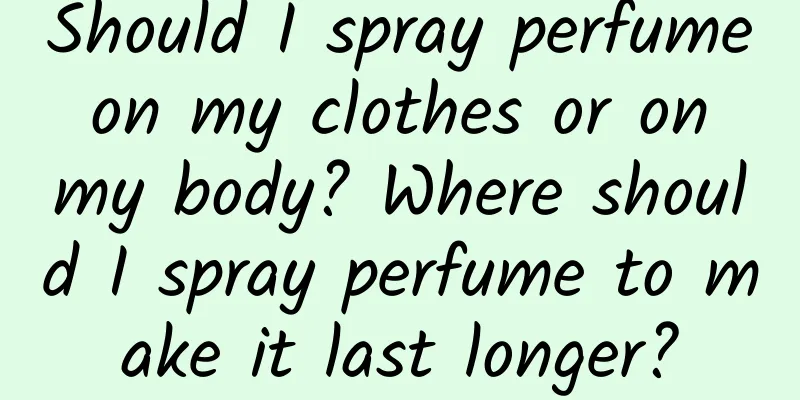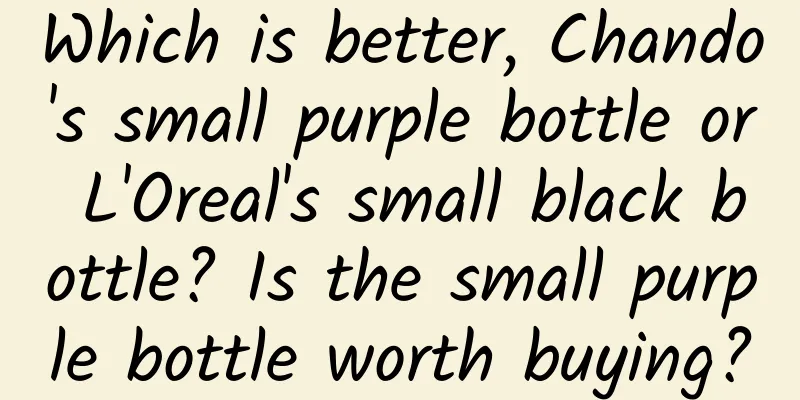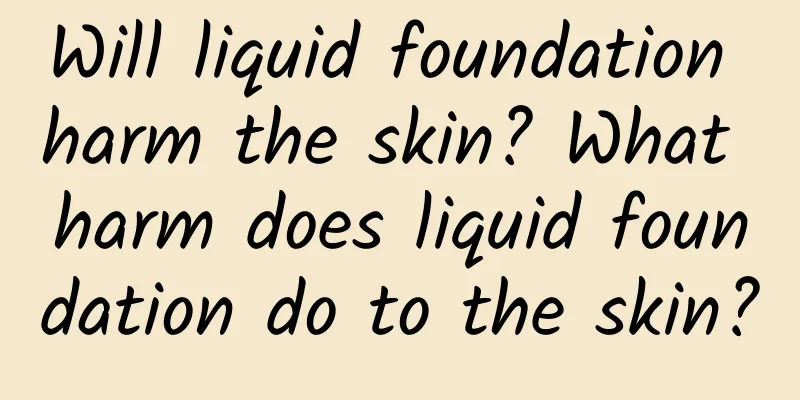Should I spray perfume on my clothes or on my body? Where should I spray perfume to make it last longer?

|
Sometimes you need to spray some perfume to increase your charm when you go out, so should you spray perfume on your clothes or on your body? Where should you spray perfume so that it can last longer? Do you spray perfume on your clothes or on your body?Perfume is to be sprayed on the body, or a small amount can be sprayed on clothes. This way the fragrance of the perfume will last longer. When spraying perfume, you must pay attention to the amount. Do not spray too much at one time, as this will make the fragrance very pungent. Where to spray perfume for the longest lasting fragrance1. On the hair. This is the habit of many women to spray perfume, or spray it in the air above the hair, wait a few seconds, the perfume falls on the hair, intertwined with the fragrance of shampoo, and then gently gather the hair, it is not too good. However, you must pay attention to friends who have this habit, do not use shampoo with strong smell, otherwise the smell of shampoo will dominate. 2. Behind the ear. Applying perfume behind the ears is also the most common place for many people to apply perfume. The biggest advantage of applying perfume behind the ears is that the fragrance lasts for a long time. The disadvantage also lies here. If you use perfume with a strong smell, it will not dissipate for a long time, and because it is close to the mouth and nose, it is easy to feel disgusted by the smell of the perfume. 3. Near the clavicle. It seems that few people spray perfume near the clavicle, but if you have the habit of spraying perfume, you might as well try it, because there are more bone structures near the clavicle and the skin is delicate, so the perfume will be more likely to come into close contact with the skin. Here, please note that when spraying perfume near the clavicle, do not smear it, but spray it diagonally above the clavicle, and do not spray too much at a time. 4. Back. Have you ever sprayed perfume on your back? You can try it. Pick up the perfume bottle, put your hands behind your back, and gently spray it twice. Just feel the perfume stay on your skin. This will not only make you smell fragrant, but also cover up body odor and sweat odor. 5. Bend your knees. Spray the perfume about ten centimeters away from the knee bend. After the perfume adheres to the knee bend, the smell will slowly spread upwards as you walk. In this way, even if it is a strong perfume, you don't have to worry about it being too greasy after applying it. 6. Bend your elbows. The principle of spraying perfume on the bend of the elbow is similar to that of spraying it on the bend of the knee, but try not to use perfume with too pungent a smell. 7. Belly button. You can spray or apply it here, the method is similar to the above. Applying perfume on your belly button will also make the perfume fit better with your skin, as if it is not the smell of perfume, but your natural body odor. What is perfume made of?There are many raw materials for perfumes. According to traditional classification, they are generally divided into artificial and natural. In fact, this classification is not accurate. One of the most frequent disputes related to perfume raw materials is the dispute between natural and artificial raw materials. Whether a raw material is natural or artificial does not determine whether it is safe. There are many other factors involved. Since natural raw materials have been used for thousands of years, while artificial raw materials have been used for less than a hundred years, natural raw materials will naturally be more recognized. However, natural raw materials may not necessarily achieve the same efficacy as artificial raw materials. The reason is that other substances in natural raw materials also play a role and affect the effect of the main substances. Natural raw materials The so-called "natural raw materials" are traditionally substances obtained from biological or animal materials through physical separation methods such as distillation and extraction. The final raw materials have basically the same chemical composition as the original materials, but in a concentrated form. These refined essences often contain hundreds of different chemical elements. Even the substances obtained in this way are not exactly the same as the original substances. In ancient civilizations, macerated spices scented the body; in the Middle Ages, Arab scientists developed the art of distillation; by the 19th century, concentrated ethanol could be used to make tinctures; and in the early 20th century, solvent extraction became feasible. Today's technology can extract or isolate a single chemical substance from natural raw materials. However, although this substance is dominant, it will still contain other substances in the raw material. Therefore, generally speaking, the purer the extracted raw material, the more expensive it is, because other impurities will change the quality of the perfume. In the perfume industry, the term "natural" refers to the origin and physical extraction of the raw materials, rather than how a substance resembles its source. Artificial flavors Artificial flavors are substances obtained through chemical reactions, usually from petroleum or turpentine. Some artificial chemicals can be isolated from nature or can only be produced artificially. Since the technology of obtaining artificial flavors from chemical reactions was developed, a large number of artificial flavors have been born, and their purity varies. As we all know, increasing purity means increasing costs. Impure impurities will affect the quality of the fragrance, and residues from chemical reactions will also have an impact, because some of these substances react strongly and affect the safety of the substances. Most of the chemical ingredients in modern perfumes are artificially synthesized. The use of artificial flavors is becoming more and more widespread. There is no doubt that artificial synthetic flavors are more economical than natural flavors. Is perfume a cosmetic?According to the "Regulations on Cosmetics Label Management" promulgated on August 27, 2007, cosmetics refer to products that are applied to the human body (skin, hair, nails, lips, teeth, etc.) by smearing, spraying, sprinkling or other similar methods to achieve the purpose of cleaning, maintenance, beautification, modification and change of appearance, or to correct human odor and maintain good condition. So perfume is a cosmetic. |
>>: How to practice one shoulder How to practice one shoulder
Recommend
Can pregnant women use Mao Geping powder cream? Is Mao Geping powder cream suitable for dry skin?
Mao Geping powder cream is a very popular conceal...
How to prevent facial stiffness after Botox injections? Face-lifting methods instead of face-lifting injections
Face-slimming injections are a very common way to...
Can normal skin use medical beauty masks? The difference between medical beauty masks and ordinary masks
There are many types of facial masks, and differe...
What is the baby face technique and what age is it suitable for?
The baby face surgery was a very popular plastic ...
Armani Blue Label Liquid Foundation Color Selection Can beauty oil be used with liquid foundation?
Armani's liquid foundation has always sold ve...
How to match a preppy dress? Back to school days
The preppy style dress is a style that many young...
The principle of cryolipolysis for weight loss and the scope of application of cryolipolysis
Cryolipolysis is a medical beauty project that he...
What is the ingredient in the cosmetic barcode starting with 697? Analysis of cosmetic ingredients
There are code labels on the packaging of skin ca...
Can I lose weight during my period? How can I lose weight during my period?
Everyone must have heard of weight loss in life, ...
What grade is Caltendon? Which country is Caltendon a brand from?
Many people pay great attention to brands when bu...
Will your eyes get bigger if you open them often? How can you make your eyes bigger naturally?
In today's beauty-conscious world, everyone w...
Causes and solutions for enlarged pores on both sides of the nose
Many of our friends have skin problems with large...
Can I wear makeup after removing a mole? It is not advisable to eat too much soy sauce after removing a mole
In our daily life, many people have moles. Some p...
How to use Zhiyouquan loose powder and its efficacy
Loose powder is actually a very important step in...
Does Bulgari Amethyst perfume smell good? How to open Bulgari Amethyst perfume
Bvlgari Amethyst Perfume is a very popular perfum...









